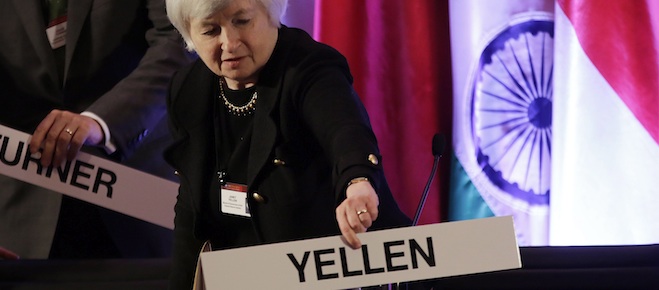Summers’ pullout does nothing to solve Obama’s gender problem
If chosen, Janet Yellen now looks like the back-up plan
Eugene Hoshiko/AP Photo
Share

When Ben Bernanke indicated he was eager to return to a more tranquil life after steering the Federal Reserve through eight of the the most tempestuous years in the history of the U.S. central bank, Barack Obama had a chance to name the first female Fed chair.
Janet Yellen, the current Fed vice-chair, was the clear favourite among academics and investors. The White House, though, let it be known via anonymous, high-up sources, that the president’s preference was with Lawrence Summers, a former Clinton treasury secretary and Obama’s former chief economic adviser. On Sunday, though, Summers withdrew from the race, citing the risk of an “acrimonious” confirmation battle in Congress, where he would have faced fierce opposition from both Republicans and progressive Democrats.
Summers’ bow-out leaves the president in an uncomfortable spot. He’s damned if he picks Yellen, and he’s damned if he doesn’t. The opportunity to score gender points is now arguably gone: The Fed would get a first chairwoman that was clearly the president’s back-up option. That historical moment, if it comes, is tarnished.
Choosing a third candidate, however, will look like an anybody-but-Yellen move. That’s likely to anger both those those who supported Yellen because she is a woman, and the many economists, including some very close to the president, who think she is far and above the best candidate for the job.
“The public lobbying on [Yellen’s] behalf appears to have annoyed the president, say administration insiders, and may lead him to look elsewhere,” the Wall Street Journal‘s David Wessel reported on Sunday night. That might be so, but Obama will look silly, or, you might say, even irresponsible, if he lets soreness guide his decision on such a key policy-making post.
There is no question that both Yellen and Summers are extraordinarily smart people. But “super smart” isn’t always enough. The strongest case for Yellen-over-Summers is one based on that ineffable quality called “judgement,” which is so difficult to gauge unless you’ve seen someone make decisions in a position of power. In a financial crisis and recession that threw much economic wisdom to the winds, Yellen got all the big calls right, as the Washington Post’s Ezra Klein eloquently put it. Some of the things Summers got wrong, by contrast, helped precipitate the meltdown of 2008.
Still, the president, who worked closely with Summers to devise the stimulus plan the administration rolled out in 2009, thought he would make a better chairman. The president might have been right. No outsider has all the information to adequately judge Obama’s preference. Still, opting for Summers required the White House to make the president’s intentions known well in advance of the actual nomination. It was necessary to do so both in order to forewarn the markets — who did not expect Summers to be in the running and know little about where the former Treasury secretary stands on monetary policy — and test the ground in terms of Congressional support for the president’s pick. In the end, the long foreplay ended up inviting a fierce public campaign against Summers that eventually forced the president to forgo his number one pick.
Appointing Yellen should have always been about selecting the best-qualified candidate. That she is a woman would have been a welcome plus.
The president still has a chance to make an excellent choice on picking the next Fed chair. However, he has forgone the “plus” part of appointing Yellen.